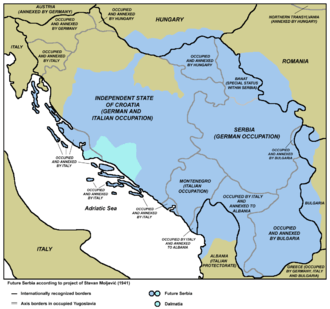Homogeneous Serbia
Homogeneous Serbia is a written discourse by Stevan Moljević. In this work, contrary to the presumptions of Ilija Garašanin who believed that the strength of the state is derived from its size and organizational principles, Moljević emphasized that the state drew its strength from the degree to which its population identifies itself within the state.[1] Moljević believed that the victorious Kingdom of Serbia in 1918 made a grave mistake when it decided to establish Yugoslavia instead of clearly defining the borders of Serbia.[2]
 Map of future Serbia as projected in Homonegeous Serbia | |
| Original title | Хомогена Србија |
|---|---|
| Created | 30 June 1941 |
| Author(s) | Stevan Moljević |
Right after the collapse of Yugoslavia during the short April war, Moljević created the concept of "homogeneous" Serbia and trialist Yugoslavia.[3] The map presented in this work awards territory of northern Dalmatia with substantial Serb population to Croatia.[4]
Moljević wrote another treatise titled An Opinion About Our State and Its Borders (Serbian: Мишљење о нашој држави, њеним границама), which he presented to Dragiša Vasić along with Homogeneous Serbia.[5]
John R. Lampe pointed to significant details such as that the Central National Committee had secondary status while Moljević did not rise to prominence in this committee until 1943, undercutting the perception about Moljević's Homogeneous Serbia being the centerpiece of a coherent set of Chetnik war objectives.[6] There is no proof that massacres of Muslims committed by Chetniks were a direct consequence of Moljevic's tract, bearing in mind the fragmented and very weak command structure of Mihailović which militated against any systematic annihilation programme.[7]
References
- (Szajkowski 1993, p. 135): "Moljevic argued, contrary to GaraSanin's presumptions, that the strength of a state came not from its principles of organization and size, but from the degree to which the population identifies with the state and is committed to it. "
- (Sfikas & Williams 1999, p. 302): "According to the Chetnik ideologue Stefan Moljevic, the fundamental mistake was made in 1918 when the borders of Serbia had not been clearly defined."
- (Krestić 2004, p. 103): "Dr. Stevan Moljevic, immediately after the April collapse of Yugoslavia in 1941, created the projects of a "homogeneous" Serbia and trialist Yugoslavia.
- (Марковић 2010, p. 162)
- (Krestić 2004, p. 53)
- (Lampe 2000, p. 206)
- (Levene 2013, p. 288)
Sources
- Szajkowski, Bogdan (1 January 1993). Encyclopaedia of Conflicts, Disputes, and Flashpoints in Eastern Europe, Russia, and the Successor States. Longman Current Affairs. ISBN 978-0-582-21002-8.CS1 maint: ref=harv (link)
- Sfikas, Thanasis D.; Williams, Christopher (1 January 1999). Ethnicity and Nationalism in East Central Europe and the Balkans. Ashgate. ISBN 978-1-85521-913-7.CS1 maint: ref=harv (link)
- Krestić, Vasilije (2004). Great Serbia: truth, misconceptions, abuses : papers presented at the International Scientific Meeting held in the Serbian Academy of Sciences and Arts Belgrade, October 24-26, 2002. SANU. ISBN 978-86-7025-377-3.CS1 maint: ref=harv (link)
- Lampe, John R. (28 March 2000). Yugoslavia as History: Twice There Was a Country. Cambridge University Press. ISBN 978-0-521-77401-7.CS1 maint: ref=harv (link)
- Марковић, Михаило (2010). SRBIJA U KRIZI. Пешић и Синови. ISBN 978-86-7540-120-9.CS1 maint: ref=harv (link)
- Levene, Mark (December 2013). Annihilation: Volume II: The European Rimlands 1939-1953. OUP Oxford. ISBN 978-0-19-968304-8.CS1 maint: ref=harv (link)